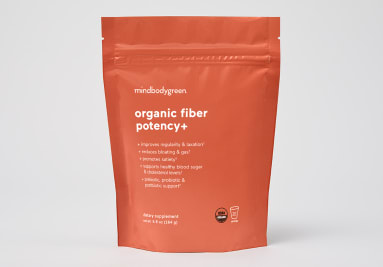Gas & Bloat Are Common Around The Holidays, But Fiber Can Help


It's no surprise many of us experience bloat around Thanksgiving. Between talking with family at the dinner table, sitting for extended periods of time, drinking alcohol, and consuming sugary, high-carb foods, this holiday is the perfect storm for gastrointestinal upset.
Here are some potential reasons you may be experiencing post-holiday bloat right now:
Advertisement
- Like most Americans, you ate more food yesterday than you usually do, and it isn't moving through your digestive system and out of your body at the ideal pace.
- You were talking too much while eating or drinking (you know, as one does during holiday dinner parties) and swallowed too much air, causing gas to accumulate in your stomach.
- You ate popular Thanksgiving foods that your small intestine has a more difficult time digesting (e.g., high-FODMAP foods like apples, dairy, asparagus, wheat, garlic, onion, honey), so they moved along the GI tract to be fermented in the large intestine (aka colon). Gas has now accumulated as a byproduct of the bacteria's fermentation process.
Don't worry, we're going to let you in on a science-backed nutrition secret that can help soothe your stomach and ease unwanted bloat (today, and throughout the holiday season): a daily fiber supplement.*
How a fiber supplement helps ease gas & bloat.
Mechanically speaking, fiber "gets things moving" by adding bulk to stool and promoting gut motility. If you don't consume adequate fiber to support healthy stool formation, food can sit in your stomach for extended periods of time and lead to GI upset.
According to a 2015 study published by the Saudi Journal of Gastroenterology, guar bean fiber effectively reduces colonic transit time1 and increases the frequency and quality of bowel movements—all of which can help ease bloat and gas.* What's more, a 2016 randomized clinical trial from Nutrition & Metabolism found that 6 grams of guar fiber per day significantly reduced bloating and gas2 for individuals with gastrointestinal health issues.*
However, guar bean fiber is only one of many dietary fibers available in supplements—and not all are created equal.
Advertisement
What type of fiber supplement to look for.
Supplements with certain types of fiber (e.g., inulin and fructooligosaccharides (FOS), aka oligofructose) may cause additional gas and bloat—especially if you have preexisting gut health concerns.
"Some fibers, like inulin, are fast-fermenting fibers. They produce gas quickly, resulting in bloat. Other fibers, such as guar fiber, ferment slowly and don't produce gas or bloat,"* explains Michael Lelah, Ph.D., chief science officer at NutriScience®.
mindbodygreen's premium organic fiber potency+ formula delivers an efficacious 6-gram dose of guar fiber (which has been clinically shown to help ease gas and bloating), plus gut-supporting ingredients green kiwifruit and Bacillus subtilis probiotic (which have been shown to ease bloat3 and promote gastric and abdominal comfort4).*
"Supplements that are specially formulated with slow-fermenting prebiotic fibers won't increase gas and bloating,"* Lelah resolves.
In addition to fiber type, you also have to be mindful of just how much dietary fiber you're adding to your daily routine—and, how quickly.
"In the short term, having too much fiber or increasing your intake too quickly without also increasing your water intake can also contribute to gas and bloating," says registered dietitian Jess Cording, M.S., R.D., CDN. She recommends increasing fiber intake gradually, drinking extra water, and moving your body to help ease bloat and promote GI comfort.
The takeaway.
While Thanksgiving is certainly one of the most food-centric holidays of the year, the next few weeks are filled with festive celebrations for many.
If you find yourself experiencing stomach upset, gas, and bloating this time of year, a quality daily fiber supplement like mbg's organic fiber potency+ might be just the tool you need to promote healthy evacuations (so you can make room for holiday cheer).*

Morgan Chamberlain is a supplement editor at mindbodygreen. She graduated from Syracuse University with a Bachelor of Science degree in magazine journalism and a minor in nutrition. Chamberlain believes in taking small steps to improve your well-being—whether that means eating more plant-based foods, checking in with a therapist weekly, or spending quality time with your closest friends. When she isn’t typing away furiously at her keyboard, you can find her cooking in the kitchen, hanging outside, or doing a vinyasa flow.

